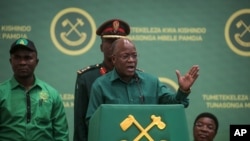Tanzanian rights activists and media outlets are accusing the government of limiting press freedom after the release of new content regulations. The rules, which went into effect this week, prohibit local media from broadcasting foreign media content without government permission and require local journalists working with foreign reporters to have a government minder.
Radio Free Africa, a local radio station based in Mwanza region, was questioned Monday by the regulatory body after airing a broadcast from the BBC Swahili service that included an interview with opposition presidential candidate Tundu Lissu. The regulatory authority complained that the interview lacked balance.
Rights groups say the aim of Tanzanian authorities is to restrict press freedom in the country.
"These are regulations that didn’t involve stakeholders and there are various things that have been seen," Jebra Kambole, an independent lawyer and human rights activist told VOA, "including heavy penalties, imprisonment and fines."
He added that when it comes to freedom of expression and imprisonment, this leads to fear among the media and citizens, limiting their freedom of expression and access to information.
Journalists like Sufiani Juma see the new regulations as restricting the way they do their jobs.
Juma said this is a series of events that involves suppression of press freedom and threats to journalists, adding that this is the way the government is forcing journalists and the media to report only stories about the government.
Leopold Mosha, a human rights activist from the Tanzania Human Rights Defenders Coalition, is urging the government to remove what he called all contradictory and suppressive regulations.
"I think the good thing is to completely erase these regulations and to remove all the segments that are contradictory to our constitution," he told VOA, "especially those that prohibit people from expressing themselves and sharing their opinions especially as we are heading to the general election."
Mosha added that media and citizens should be granted the right to conduct debates, share and receive information without any oppressive restrictions.
In an interview with the BBC, Tanzanian Information Minister Harrison Mwakyembe said the government has not banned foreign content in the local media. Instead, he said, the new regulations will enable the government to know which stations airing programs in Tanzania have partnered with foreign broadcasters.
But with Tanzania expected to hold general elections in October, the government move has raised further questions about the state of democracy and free speech in the country.
In a statement Friday, Acting VOA Director Elez Biberaj said this is the first time Tanzania or any East African government has made such a brazen move to restrict press freedom. If this is not reversed, he said, the Tanzanian people will be denied important information as they prepare to go to the polls.




